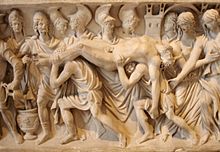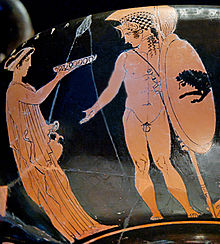Hector
![]()
This article is about the character Hector from Greek mythology. For other meanings, see Hector (disambiguation) and Hector.
Hector (Ancient Greek Ἕκτωρ) is a character from Homer's famous epic poem Iliad, from which much of the information known today about Greek mythology comes. He is the eldest son of the king of Troy, Priam, and of his wife Hecabe, before his younger brother Paris. He is the most important hero and army commander of Troy in the ten-year Trojan War.
Homer describes the 51 days of action from the outbreak of the wrath of the Greek hero Achilles, the strongest fighter on the side of the Achaeans, to Hector's fall and burial. Homer, as well as Virgil in his Aeneid, describe Hector as a noble hero. Many later idealized depictions are based on this, seeing Hector as a symbolic figure of chivalry. Thus, in the Middle Ages, he is included in the ranks of the Neuf Preux, the nine bold knights, alongside Caesar and Alexander the Great, among others. For modern times, see, for example, Friedrich Schiller's Hektorlied.
Hector of the Iliad is the protégé of Apollo and is portrayed not only as a capable fighter, but also as a son, brother, loving husband and father. Large portions of his description are devoted to his parting with his wife Andromache and son Astyanax. He, like the other heroes, is portrayed as a minion of various gods who have decided victory and defeat, life and death, even before the actual deed is done.
In the course of the battles of the Iliad, the Trojans succeed in driving the Achaeans back to their ships, who are unable to oppose Hector and the other Trojan heroes as long as the resentful Achilles refuses to take part in the battle. Hector himself shatters the gate to the fortifications with a single throw of a stone. In the threatening situation, Patroclus, Achilleus' cousin, with Achilleus' consent, puts on Achilleus' armor and leads the Myrmidons, Achilleus' retainers, into battle in his place. He succeeds in beating back the Trojans. Patroclus himself, however, is slain by Hector. Hektor believed that he had killed Achilles. Achilles then intervenes in the action again and drives the Trojans back into the city. Hector is the only one left outside the walls to face him. Three times he is chased by Achilles around the walls of Troy until he turns himself in through a ruse of Athena's and is killed. Dying, Hector asks that his body be returned to the city, but Achilles pierces his heels and drags the body around his friend's grave for twelve days. To put an end to this, Zeus instructs Thetis, Achilles' mother, to bring her son to his senses. The latter is finally persuaded by King Priam - who sneaks into the Greek camp at night as a supplicant - to take pity on him and leaves him the corpse. The Iliad ends with the Trojans mourning Hector for eleven days.

The body of Hector is brought home. Roman relief, ca. 180-200 AD.

Cassandra and Hector on an Attic red-figure cantharos by the Eretria Painter, c. 425/420 BC.
Search within the encyclopedia